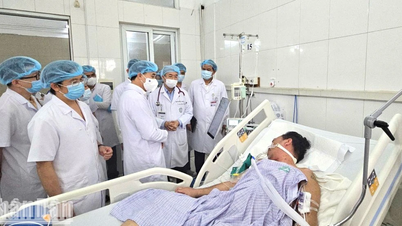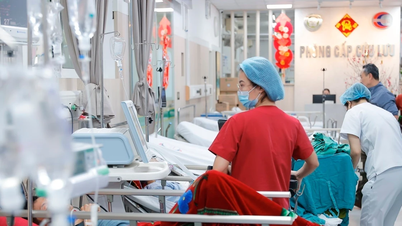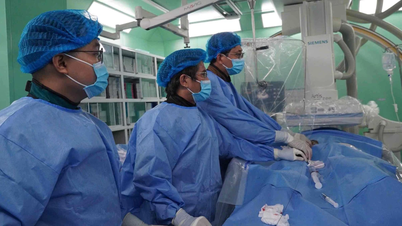Doctor Vu Duc Thinh - Department of Digestive Surgery, Viet Duc Friendship Hospital said that the child was brought to the hospital on March 31 with two bite marks on the neck that were oozing saliva. This raised concerns about deep damage to important organs such as the trachea and esophagus.
Immediately, the doctors ordered a CT scan to assess the entire injury. Fortunately, the trachea was not affected, but an endoscopy showed two holes in the esophagus. If not treated promptly, the child could have dangerous complications such as mediastinitis (an infection between the two lungs), sepsis, or persistent esophageal fistula. Immediately, the doctors expanded the wound, controlled the damage, and performed a gastrostomy to feed the child through a tube, giving the esophagus time to recover.
In addition, although the dog had been vaccinated against rabies, doctors could not completely rule out the risk of rabies infection. Therefore, the patient was consulted with epidemiologists and immediately injected with three doses of serum antitoxin, one dose of rabies vaccine, continued monitoring and completed the full regimen to ensure safety.
Previously, according to the family, the child was playing with a dog when he was suddenly bitten in the neck. Because this pet had been raised for a long time and had been vaccinated against rabies, the family was complacent and did not take the child to the hospital immediately but continued to live normally at home.
It was not until mealtime, when the baby was chewing and swallowing, that the family discovered saliva and food flowing from the wound on the neck. At this time, the baby was taken to the hospital for emergency treatment.
Currently, after surgery and intensive treatment, the baby is out of danger and is continuing to be monitored and cared for.
Doctors recommend that when bitten by a dog or any animal, the patient should:
Disinfect immediately: Wash the wound with soap and water for at least 15 minutes, then disinfect with alcohol or antiseptic solution.
Do not be subjective even if the wound is small: Even if the bite does not bleed much, bacteria or viruses from animal saliva can still penetrate and cause deep infection.
Go to a medical facility immediately: Especially for bites in dangerous areas such as the head, face, neck, arms, and legs. Rabies vaccination and thorough examination are required if there are signs of infection.
Monitor the biting animal for 10-14 days: If the animal shows any unusual signs, notify the doctor immediately for timely treatment.
Source: https://baophapluat.vn/be-gai-11-tuoi-bi-thung-thuc-quan-vi-con-vat-thuong-thay-trong-nha-post544999.html



![[Photo] Prime Minister Pham Minh Chinh receives Swedish Minister of International Development Cooperation and Foreign Trade](https://vphoto.vietnam.vn/thumb/1200x675/vietnam/resource/IMAGE/2025/5/12/ae50d0bb57584fd1bbe1cd77d9ad6d97)
![[Photo] Prime Minister Pham Minh Chinh starts construction of vital highway through Thai Binh and Nam Dinh](https://vphoto.vietnam.vn/thumb/1200x675/vietnam/resource/IMAGE/2025/5/12/52d98584ccea4c8dbf7c7f7484433af5)
![[Photo] Prime Minister Pham Minh Chinh works with the Standing Committee of Thai Binh Provincial Party Committee](https://vphoto.vietnam.vn/thumb/1200x675/vietnam/resource/IMAGE/2025/5/12/f514ab990c544e05a446f77bba59c7d1)







![[Video] International Nurses Day (May 12): Honoring the silent contributions](https://vphoto.vietnam.vn/thumb/402x226/vietnam/resource/IMAGE/2025/5/12/e417af33166f4fa28057c788dcd9086f)














































































Comment (0)